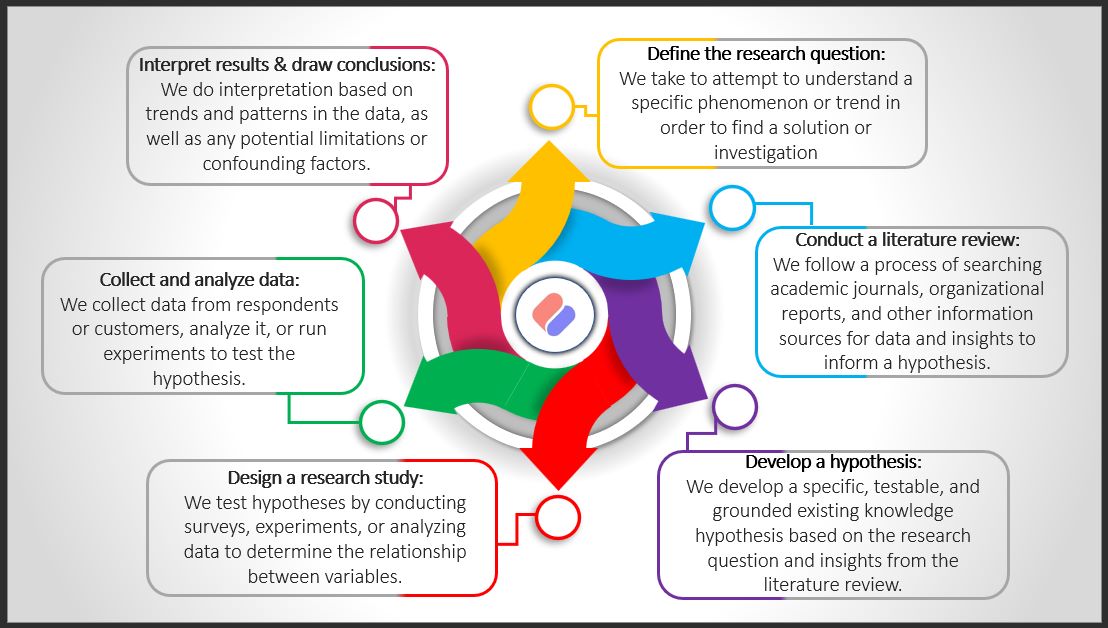

Perfect Choice
Conducting research that advances knowledge and contributes to scientific and technological advancements.
Hypothesis Research & Literature Review
JaeTech Research team creates an excellent review that can be an invaluable tool for practitioners, providing a concise summary and analysis of the relevant information in a given area. JaeTech conducts hypothesis research & literature reviews in a variety of ways, depending on the nature of the research question and the resources available.




Define the research question
We define the research question, issue, or opportunity to find the solution or investigation involves attempting to comprehend a specific phenomenon or trend.
Conduct a literature review
We conduct a comprehensive literature review after identifying the research question to understand what is already known about the topic.
Develop a hypothesis
We develop a specific, testable, and grounded existing knowledge hypothesis based on the research question and the insights gleaned from the literature review.
Design a research study
We design a research study to test the hypothesis by conducting surveys, running experiments, or analyzing data to determine the relationship between variables.
Collect and analyze data
After designing the research study, we collect data from respondents or customers, analyze the collected data, or run experiments to test the hypothesis.
Interpret the results & draw conclusions
Once the data has been analyzed, we interpret the results and draw conclusions based on the trends or patterns in the data, as well as any potential limitations or confounding factors.


Data collection
and Analysis
JaeTech offers a full suite of outsourcing data collection services to collect qualitative and quantitative data within a stipulated time frame. JaeTech's dedicated team of analysts helps you out with scientific analysis dilemmas.

Epidemic investigation &
management
Epidemic investigation and management involve a complex process of identifying the cause of an outbreak, tracking its spread, implementing measures to control and contain it, and developing strategies to prevent future occurrences. JaeTech plays a crucial role in this process by providing scientific expertise and conducting studies that inform public health policies and interventions.


Surveillance
JaeTech establish surveillance systems to monitor the spread of the epidemic and identify new cases by collecting data from hospitals, clinics, and other healthcare facilities, as well as from community-based sources such as schools and workplaces.
Evaluation
JaeTech evaluates the effectiveness of interventions through randomized controlled trials, observational studies, and other research methods.
Epidemiological investigations
JaeTech conduct epidemiological studies to identify risk factors for the disease and map the spread of the epidemic by analyzing data on the demographic and clinical characteristics of affected individuals, as well as conducting surveys and interviews with affected communities.
Laboratory testing
JaeTech conduct laboratory tests to identify the causative agent of the epidemic and determine its characteristics, such as its genetic makeup, mode of transmission, and virulence.
Development of interventions
Based on the results of investigations, JaeTech develops interventions to control and contain the epidemic, such as vaccines, drugs, or public health messaging campaigns.
Tools that we use
We use EpiInfo, Ona, DHIS2, and our custom application.



Manuscript writing & publication
The process of manuscript writing and publication can be time-consuming and complex, requiring careful planning and attention to detail. However, it is an essential part of the research process, allowing to share of findings with a broader audience and contributing to the scientific community's knowledge base.
Planning and Writing the Manuscript
Eam animal cons incorupte, de serun et princip deos. Virtute eripuit est an. An quo dolorem lobortis ullam est corper.
Review and Editing
Once the initial draft is completed, the manuscript were reviewed and edited by a team of experts in the field through multiple rounds of revisions to ensure the manuscript is accurate and meets the standards of the intended publication.
Submission
Once the manuscript has been reviewed and edited, it was submitted to a suitable journal or conference for publication. JaeTech has a list of preferred journals or conferences based on the topic of the manuscript and the target audience.
Peer Review
The submitted manuscript will undergo a rigorous peer-review process which will be evaluated by experts in the field. The reviewers will provide feedback and suggest revisions to improve the manuscript's quality.
Revision and Resubmission
Based on the feedback received from the peer-review process, the manuscript may need to be revised and resubmitted. JaeTech researchers make significant changes to the manuscript or address specific concerns raised by the reviewers.
Acceptance and Publication
If the manuscript is accepted, JaeTech work with the publisher to finalize the publication by formatting, proofreading, and finalizing any supplementary materials, such as figures or data tables.
Systematic review & meta-analysis
JaeTech has extensive experience with meta-analysis, which is a quantitative, formal, epidemiological study design used to systematically assess the results of previous research in order to draw conclusions about that body of research. Performing a systematic review and meta-analysis involves a rigorous and structured approach that requires a team of researchers with expertise in the relevant subject matter.




Define the research question
JaeTech conduct a systematic review and meta-analysis by using a clearly defined research question or objective. It will guide the search strategy and the inclusion and exclusion criteria for studies.
Develop a search strategy
JaeTech develops a comprehensive search strategy to identify relevant studies by searching multiple databases, such as PubMed, Embase, and Cochrane Library, using a combination of keywords and search terms. The search strategy was documented and reported transparently.
Screening studies
After the search is conducted, the identified studies are screened for inclusion and exclusion criteria. The screening process is carried out by two or more reviewers independently screening the studies and resolving any discrepancies through discussion and consensus.
Extracting data
Once the studies are selected, data is extracted from the studies using a standardized data extraction form. The data was extracted by study characteristics, participant characteristics, interventions, outcomes, and measures of effect size.
Assessing study quality
JaeTech ensures the quality of the included studies by assessing using standardized tools, such as the Cochrane Risk of Bias tool or the Newcastle-Ottawa Scale. The quality assessment helps to determine the strength of evidence and the risk of bias in the studies.
Synthesizing data
The data from the included studies are synthesized using statistical methods to estimate the overall effect size and the level of heterogeneity between the studies. Meta-analysis was performed if the studies are sufficiently homogenous.
Interpreting results
The results are interpreted in light of the research question and the overall quality of the evidence. The results were presented in a narrative summary, tables, and/or forest plots.


Disease surveillance
& response
Disease surveillance and response are complex and ongoing process that requires ongoing monitoring, analysis, and response activities to control disease outbreaks. JaeTech plays a critical role in this process by developing and implementing effective surveillance and response systems.
Establish surveillance systems
JaeTech establish a surveillance system to monitor the spread of diseases in different populations by collecting data from various sources, such as healthcare facilities, laboratories, and public health agencies.
Analyze data
The data collected from the surveillance systems need to be analyzed to identify potential disease outbreaks by using statistical models and machine learning algorithms to identify patterns and trends in the data.
Investigate outbreaks
Once a disease outbreak has been identified, JaeTech researchers investigate the outbreak to determine the cause and extent of the outbreak by conducting epidemiological studies, analyzing clinical data, and collecting samples for laboratory testing.
Develop response plans
Based on the findings from the investigation, JaeTech researchers develop response plans to control the spread of the disease. These plans were implementing public health interventions, such as vaccination campaigns or quarantine measures.
Assessing study quality
JaeTech ensures the quality of the included studies by assessing using standardized tools, such as the Cochrane Risk of Bias tool or the Newcastle-Ottawa Scale. The quality assessment helps to determine the strength of evidence and the risk of bias in the studies.
Monitor response activities
JaeTech researchers monitor the implementation of response activities to ensure the effectiveness in controlling the outbreak by ongoing data collection and analysis to assess the impact of the response activities.
Evaluate outcomes
Finally, JaeTech researchers evaluate the outcomes of disease surveillance and response activities by assessing the effectiveness of the response activities in controlling the outbreak and identifying areas for improvement in future outbreaks.
